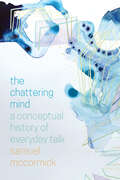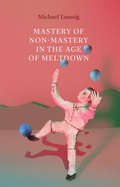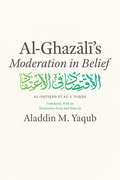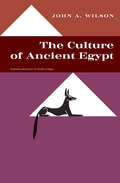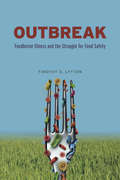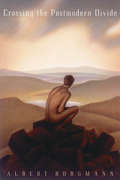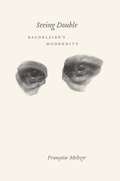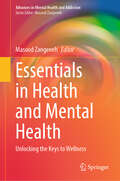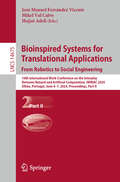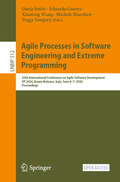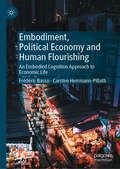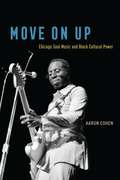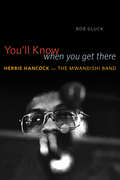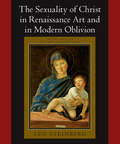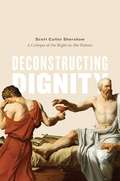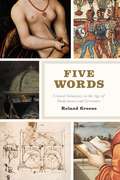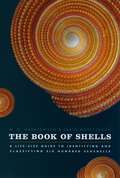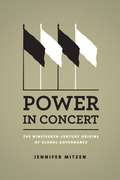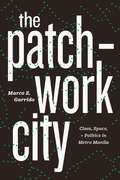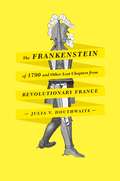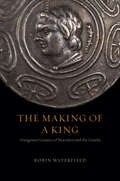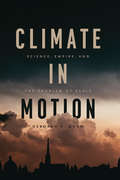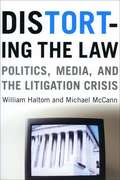- Table View
- List View
The Chattering Mind: A Conceptual History of Everyday Talk
by Samuel McCormickFrom Plato’s contempt for “the madness of the multitude” to Kant’s lament for “the great unthinking mass,” the history of Western thought is riddled with disdain for ordinary collective life. But it was not until Kierkegaard developed the term chatter that this disdain began to focus on the ordinary communicative practices that sustain this form of human togetherness. The Chattering Mind explores the intellectual tradition inaugurated by Kierkegaard’s work, tracing the conceptual history of everyday talk from his formative account of chatter to Heidegger’s recuperative discussion of “idle talk” to Lacan’s culminating treatment of “empty speech”—and ultimately into our digital present, where small talk on various social media platforms now yields big data for tech-savvy entrepreneurs. In this sense, The Chattering Mind is less a history of ideas than a book in search of a usable past. It is a study of how the modern world became anxious about everyday talk, figured in terms of the intellectual elites who piqued this anxiety, and written with an eye toward recent dilemmas of digital communication and culture. By explaining how a quintessentially unproblematic form of human communication became a communication problem in itself, McCormick shows how its conceptual history is essential to our understanding of media and communication today.
Mastery of Non-Mastery in the Age of Meltdown
by Michael TaussigFor centuries, humans have excelled at mimicking nature in order to exploit it. Now, with the existential threat of global climate change on the horizon, the ever-provocative Michael Taussig asks what function a newly invigorated mimetic faculty might exert along with such change. Mastery of Non-Mastery in the Age of Meltdown is not solely a reflection on our condition but also a theoretical effort to reckon with the impulses that have fed our relentless ambition for dominance over nature. Taussig seeks to move us away from the manipulation of nature and reorient us to different metaphors and sources of inspiration to develop a new ethical stance toward the world. His ultimate goal is to undo his readers’ sense of control and engender what he calls “mastery of non-mastery.” This unique book developed out of Taussig’s work with peasant agriculture and his artistic practice, which brings performance art together with aspects of ritual. Through immersive meditations on Walter Benjamin, D. H. Lawrence, Emerson, Bataille, and Proust, Taussig grapples with the possibility of collapse and with the responsibility we bear for it.
Al-Ghazali's "Moderation in Belief": Al-Iqti?ad Fi Al-I ' Tiqad
by Al-GhazaliCenturies after his death, al-Ghazali remains one of the most influential figures of the Islamic intellectual tradition. Although he is best known for his Incoherence of the Philosophers, Moderation in Belief is his most profound work of philosophical theology. In it, he offers what scholars consider to be the best defense of the Ash'arite school of Islamic theology that gained acceptance within orthodox Sunni theology in the twelfth century, though he also diverges from Ash'arism with his more rationalist approach to the Quran. Together with The Incoherence of the Philosophers, Moderation in Belief informs many subsequent theological debates, and its influence extends beyond the Islamic tradition, informing broader questions within Western philosophical and theological thought. The first complete English-language edition of Moderation in Belief, this new annotated translation by Aladdin M. Yaqub draws on the most esteemed critical editions of the Arabic texts and offers detailed commentary that analyzes and reconstructs the arguments found in the work’s four treatises. Explanations of the historical and intellectual background of the texts also enable readers with a limited knowledge of classical Arabic to fully explore al-Ghazali and this foundational text for the first time. With the recent resurgence of interest in Islamic philosophy and the conflict between philosophy and religion, this new translation will be a welcome addition to the scholarship.
The Culture of Ancient Egypt: Originally published as The Burden of Egypt
by John A. WilsonThe story of Egypt is the story of history itself—the endless rise and fall, the life and death and life again of the eternal human effort to endure, enjoy, and understand the mystery of our universe. Emerging from the ancient mists of time, Egypt met the challenge of the mystery in a glorious evolution of religious, intellectual, and political institutions and for two millenniums flourished with all the vigor that the human heart can invest in a social and cultural order. Then Egypt began to crumble into the desert sands and the waters of the Nile, and her remarkable achievements in civilization became her lingering epitaph. John A. Wilson has written a rich and interpretive biography of one of the greatest cultural periods in human experience. He answers—as best the modern Egyptologist can—the questions inevitably asked concerning the dissolution of Egypt's glory. Here is scholarship in its finest form, concerned with the humanity that has preceded us, and finding in man's past grandeur and failure much meaning for men of today.
Outbreak: Foodborne Illness and the Struggle for Food Safety
by Timothy D. LyttonFoodborne illness is a big problem. Wash those chicken breasts, and you’re likely to spread Salmonella to your countertops, kitchen towels, and other foods nearby. Even salad greens can become biohazards when toxic strains of E. coli inhabit the water used to irrigate crops. All told, contaminated food causes 48 million illnesses, 128,000 hospitalizations, and 3,000 deaths each year in the United States. With Outbreak, Timothy D. Lytton provides an up-to-date history and analysis of the US food safety system. He pays particular attention to important but frequently overlooked elements of the system, including private audits and liability insurance. Lytton chronicles efforts dating back to the 1800s to combat widespread contamination by pathogens such as E. coli and salmonella that have become frighteningly familiar to consumers. Over time, deadly foodborne illness outbreaks caused by infected milk, poison hamburgers, and tainted spinach have spurred steady scientific and technological advances in food safety. Nevertheless, problems persist. Inadequate agency budgets restrict the reach of government regulation. Pressure from consumers to keep prices down constrains industry investments in safety. The limits of scientific knowledge leave experts unable to assess policies’ effectiveness and whether measures designed to reduce contamination have actually improved public health. Outbreak offers practical reforms that will strengthen the food safety system’s capacity to learn from its mistakes and identify cost-effective food safety efforts capable of producing measurable public health benefits.
Crossing the Postmodern Divide
by Albert BorgmannIn this eloquent guide to the meanings of the postmodern era, Albert Borgmann charts the options before us as we seek alternatives to the joyless and artificial culture of consumption. Borgmann connects the fundamental ideas driving his understanding of society's ills to every sphere of contemporary social life, and goes beyond the language of postmodern discourse to offer a powerfully articulated vision of what this new era, at its best, has in store. "[This] thoughtful book is the first remotely realistic map out of the post modern labyrinth."—Joseph Coates, The Chicago Tribune "Rather astoundingly large-minded vision of the nature of humanity, civilization and science."—Kirkus Reviews
The Reconstruction Amendments: The Essential Documents
by Kurt T. LashRatified in the years immediately following the American Civil War, the Thirteenth, Fourteenth, and Fifteenth Amendments to the United States Constitution—together known as the Reconstruction Amendments—abolished slavery, safeguarded a set of basic national liberties, and expanded the right to vote, respectively. This two-volume work presents the key speeches, debates, and public dialogues that surrounded the adoption of the three amendments, allowing us to more fully experience how they reshaped the nature of American life and freedom. Volume I outlines a broad historical context for the Reconstruction Amendments along with materials related to the Thirteenth Amendment, which abolished slavery, while Volume II covers the Fourteenth and Fifteenth Amendments on the rights of citizenship and enfranchisement. The documents in this collection encompass a sweeping range of primary sources, from congressional talks to court cases, public speeches to newspaper articles. As a whole, the volumes meticulously depict a significant period of legal change even as they illuminate the ways in which people across the land grappled with the process of constitutional reconstruction. Filling a major gap in the literature on the era, The Reconstruction Amendments will be indispensable for readers in politics, history, and law, as well as anyone seeking a better understanding of the post–Civil War basis of American constitutional democracy.
Seeing Double: Baudelaire's Modernity
by Françoise MeltzerThe poet Charles Baudelaire (1821–1867) has been labeled the very icon of modernity, the scribe of the modern city, and an observer of an emerging capitalist culture. Seeing Double reconsiders this iconic literary figure and his fraught relationship with the nineteenth-century world by examining the way in which he viewed the increasing dominance of modern life. In doing so, it revises some of our most common assumptions about the unresolved tensions that emerged in Baudelaire’s writing during a time of political and social upheaval.Françoise Meltzer argues that Baudelaire did not simply describe the contradictions of modernity; instead, his work embodied and recorded them, leaving them unresolved and often less than comprehensible. Baudelaire’s penchant for looking simultaneously backward to an idealized past and forward to an anxious future, while suspending the tension between them, is part of what Meltzer calls his “double vision”—a way of seeing that produces encounters that are doomed to fail, poems that can’t advance, and communications that always seem to falter. In looking again at the poet and his work, Seeing Double helps to us to understand the prodigious transformations at stake in the writing of modern life.
Seeking Molecular Biomarkers for Schizophrenia Using ROC Analysis
by Margareth Borges Coutinho GalloSchizophrenia Spectrum Disorders (SSD) manifest multidimensionally, presenting a syndromic nature with several symptomatic domains. These are driven by dynamic systemic biological changes that unfold over the course of the disease. Thus far, the diagnosis is solely based on symptoms, which may be rather subjective, moving research toward the search for SSD biomarkers. This book presents a summary of the main hypotheses that have evolved over time to explain the pathophysiology of SSD and that have driven the discovery of associated biomarkers: neurotrophic, neurotransmitter, neuroendocrine, immune-inflammatory, nitrosative/oxidative stress, metabolic, and gut microbiota-brain axis. The book shows the most relevant research carried out in the last twelve years to develop predictive, diagnostic, theranostic or transdiagnostic models based on these biomarkers using the receiver operating characteristic curve (ROC) analysis. Chapters also discuss how the literature has addressed the development and/or addition of new discriminatory biomarkers to achieve robust and successful results. The book is rounded out with a step-by-step explanation on how to work on the MetaboAnalyst platform, including the meaning of the chosen statistics and how to interpret them in the results obtained. This book is a useful resource for students and scientists involved in the discovery of biomarkers for psychiatric disorders and other diseases.
Essentials in Health and Mental Health: Unlocking the Keys to Wellness (Advances in Mental Health and Addiction)
by Masood ZangenehIn a world increasingly characterized by rapid change and constant challenges, maintaining good physical and mental health is more important than ever. "Essentials in Health & Mental Health" is a comprehensive exploration of the multifaceted landscape of health and well-being, delving into key aspects that affect individuals of all ages, backgrounds, and circumstances. Through the lens of 20 meticulously crafted chapters, this book takes you on a journey to understand the essential elements that contribute to our overall health, from the invisible struggles of loneliness and mental health problems to the impact of global events like the COVID-19 pandemic. The book begins with an eye-opening chapter that sheds light on the pervasive nature of loneliness and its profound impact on the functioning of individuals. The authors delve into the various costs of loneliness and uncover the under-recognized association between loneliness and mental health problems. In a world interconnected like never before, these insights are essential for anyone seeking to understand the complexities of human well-being.
Bioinspired Systems for Translational Applications: 10th International Work-Conference on the Interplay Between Natural and Artificial Computation, IWINAC 2024, Olhâo, Portugal, June 4–7, 2024, Proceedings, Part II (Lecture Notes in Computer Science #14675)
by Hojjat Adeli José Manuel Ferrández Vicente Mikel Val CalvoThe two volume set LNCS 14674 and 14675 constitutes the proceedings of the 10th International Work-Conference on the Interplay Between Natural and Artificial Computation, IWINAC 2024, which took place in Olhâo, Portugal, during June 4–7, 2024. The 99 full papers presented in these proceedings were carefully reviewed and selected from 193 submissions. They were organized in topical sections as follows: Part I: Machine learning in neuroscience; artificial intelligence in neurophysiology; neuromotor and cognitive disorders; intelligent systems for assessment, treatment, and assistance in early stages of Alzheimer's disease and other dementias; socio-cognitive, affective and physiological computing; affective computing and context awareness in ambientintelliigence; learning tools to lecture; Part II: Machine learning in computer vision and robotics; bio-inspired computing approaches; social and civil engineering through human AI translations; smart renewable energies: advancing AI algorithms in the renewable energy industry; bioinspired applications.
Agile Processes in Software Engineering and Extreme Programming: 25th International Conference on Agile Software Development, XP 2024, Bozen-Bolzano, Italy, June 4–7, 2024, Proceedings (Lecture Notes in Business Information Processing #512)
by Xiaofeng Wang Peggy Gregory Eduardo Guerra Michele Marchesi Darja ŠmiteThis open access book constitutes the proceedings of the 25th International Conference on Agile Software Development, XP 2024, which took place in Bozen-Bolzano, Italy, during June 04-07, 2024. XP is the premier agile software development conference combining research and practice. It is a unique forum where agile researchers, practitioners, thought leaders, coaches, and trainers get together to present and discuss their most recent innovations, research results, experiences, concerns, challenges, and trends. XP conferences provide an informal environment to learn and trigger discussions and welcome both people new to agile and seasoned agile practitioners. This year’s conference was held with the theme “Reflect, Adapt, Envision”. The 10 full and 2 short papers included in these proceedings were carefully reviewed and selected from 32 submissions. They were organized in topical sections as follows: agile at scale; value and quality in agile; and people and teams in agile.
Embodiment, Political Economy and Human Flourishing: An Embodied Cognition Approach to Economic Life
by Carsten Herrmann-Pillath Frédéric BassoThis book presents embodied economics as a foundational alternative to behavioral economics and other projects integrating economics and psychology inspired by the computational paradigm. The 20th century witnessed the disembodiment of economic models through the intensification of mathematization and formal abstraction in economics. Even proponents of an embodied approach to cognition, such as Hayek, paradoxically championed the abstract market order as a disembodied superhuman intelligence. In the wake of groundbreaking perspectives in cognitive and social sciences, which have helped to rethink the fundamental building blocks of economics, agency and institutions, this title takes a radical turn towards embodiment. Reinstating economics as political economy, embodied economics motivates a critique of capitalism based on the analysis of disembodiment through abstraction and reactivates key critical insights into the anthropology put forward by the young Marx about contemporary economics and its conceptualizations of money, property, and labor. Based on this analysis, the authors envision a concrete utopia for an economic order centered on human dignity and care for life on Earth. This book contributes to recent discussions about behavioral, experimental and neuroeconomics and addresses a transdisciplinary audience in the social and behavioral sciences, philosophy, and the humanities.
Move On Up: Chicago Soul Music and Black Cultural Power
by Aaron CohenA Chicago Tribune Book of 2019, Notable Chicago Reads A Booklist Top 10 Arts Book of 2019 A No Depression Top Music Book of 2019 Curtis Mayfield. The Chi-Lites. Chaka Khan. Chicago’s place in the history of soul music is rock solid. But for Chicagoans, soul music in its heyday from the 1960s to the 1980s was more than just a series of hits: it was a marker and a source of black empowerment. In Move On Up, Aaron Cohen tells the remarkable story of the explosion of soul music in Chicago. Together, soul music and black-owned businesses thrived. Record producers and song-writers broadcast optimism for black America’s future through their sophisticated, jazz-inspired productions for the Dells and many others. Curtis Mayfield boldly sang of uplift with unmistakable grooves like “We’re a Winner” and “I Plan to Stay a Believer.” Musicians like Phil Cohran and the Pharaohs used their music to voice Afrocentric philosophies that challenged racism and segregation, while Maurice White of Earth, Wind, and Fire and Chaka Khan created music that inspired black consciousness. Soul music also accompanied the rise of African American advertisers and the campaign of Chicago’s first black mayor, Harold Washington, in 1983. This empowerment was set in stark relief by the social unrest roiling in Chicago and across the nation: as Chicago’s homegrown record labels produced rising stars singing songs of progress and freedom, Chicago’s black middle class faced limited economic opportunities and deep-seated segregation, all against a backdrop of nationwide deindustrialization. Drawing on more than one hundred interviews and a music critic’s passion for the unmistakable Chicago soul sound, Cohen shows us how soul music became the voice of inspiration and change for a city in turmoil.
You'll Know When You Get There: Herbie Hancock and the Mwandishi Band
by Bob GluckAs the 1960s ended, Herbie Hancock embarked on a grand creative experiment. Having just been dismissed from the celebrated Miles Davis Quintet, he set out on the road, playing with his first touring group as a leader until he eventually formed what would become a revolutionary band. Taking the Swahili name Mwandishi, the group would go on to play some of the most innovative music of the 1970s, fusing an assortment of musical genres, American and African cultures, and acoustic and electronic sounds into groundbreaking experiments that helped shape the American popular music that followed. In You’ll Know When You Get There, Bob Gluck offers the first comprehensive study of this influential group, mapping the musical, technological, political, and cultural changes that they not only lived in but also effected. Beginning with Hancock’s formative years as a sideman in bebop and hard bop ensembles, his work with Miles Davis, and the early recordings under his own name, Gluck uncovers the many ingredients that would come to form the Mwandishi sound. He offers an extensive series of interviews with Hancock and other band members, the producer and engineer who worked with them, and a catalog of well-known musicians who were profoundly influenced by the group. Paying close attention to the Mwandishi band’s repertoire, he analyzes a wide array of recordings—many little known—and examines the group’s instrumentation, their pioneering use of electronics, and their transformation of the studio into a compositional tool. From protofunk rhythms to synthesizers to the reclamation of African identities, Gluck tells the story of a highly peculiar and thrillingly unpredictable band that became a hallmark of American genius.
The Sexuality of Christ in Renaissance Art and in Modern Oblivion
by Leo SteinbergOriginally published in 1983, Leo Steinberg's classic work has changed the viewing habits of a generation. After centuries of repression and censorship, the sexual component in thousands of revered icons of Christ is restored to visibility. Steinberg's evidence resides in the imagery of the overtly sexed Christ, in Infancy and again after death. Steinberg argues that the artists regarded the deliberate exposure of Christ's genitalia as an affirmation of kinship with the human condition. Christ's lifelong virginity, understood as potency under check, and the first offer of blood in the circumcision, both required acknowledgment of the genital organ. More than exercises in realism, these unabashed images underscore the crucial theological import of the Incarnation. This revised and greatly expanded edition not only adduces new visual evidence, but deepens the theological argument and engages the controversy aroused by the book's first publication.
Deconstructing Dignity: A Critique of the Right-to-Die Debate
by Scott Cutler ShershowThe right-to-die debate has gone on for centuries, playing out most recently as a spectacle of protest surrounding figures such as Terry Schiavo. In Deconstructing Dignity, Scott Cutler Shershow offers a powerful new way of thinking about it philosophically. Focusing on the concepts of human dignity and the sanctity of life, he employs Derridean deconstruction to uncover self-contradictory and damaging assumptions that underlie both sides of the debate. Shershow examines texts from Cicero’s De Officiis to Kant’s Groundwork of the Metaphysics of Morals to court decisions and religious declarations. Through them he reveals how arguments both supporting and denying the right to die undermine their own unconditional concepts of human dignity and the sanctity of life with a hidden conditional logic, one often tied to practical economic concerns and the scarcity or unequal distribution of medical resources. He goes on to examine the exceptional case of self-sacrifice, closing with a vision of a society—one whose conditions we are far from meeting—in which the debate can finally be resolved. A sophisticated analysis of a heated topic, Deconstructing Dignity is also a masterful example of deconstructionist methods at work.
Five Words: Critical Semantics in the Age of Shakespeare and Cervantes
by Roland GreeneBlood. Invention. Language. Resistance. World. Five ordinary words that do a great deal of conceptual work in everyday life and literature. In this original experiment in critical semantics, Roland Greene considers how these words changed over the course of the sixteenth century and what their changes indicate about broader forces in science, politics, and other disciplines. Rather than analyzing works, careers, or histories, Greene discusses a broad swath of Renaissance and transatlantic literature—including Shakespeare, Cervantes, Camões, and Milton—in terms of the development of these five words. Aiming to shift the conversation around Renaissance literature from current approaches to riskier enterprises, Greene also proposes new methods that take advantage of digital resources like full-text databases, but still depend on the interpreter to fashion ideas out of ordinary language. Five Words is an innovative and accessible book that points the field of literary studies in an exciting new direction.
The Book of Shells: A Life-Size Guide to Identifying and Classifying Six Hundred Seashells
by Fabio Moretzsohn M.G. HarasewychWho among us hasn’t marveled at the diversity and beauty of shells? Or picked one up, held it to our ear, and then gazed in wonder at its shape and hue? Many a lifelong shell collector has cut teeth (and toes) on the beaches of the Jersey Shore, the Outer Banks, or the coasts of Sanibel Island. Some have even dived to the depths of the ocean. But most of us are not familiar with the biological origin of shells, their role in explaining evolutionary history, and the incredible variety of forms in which they come. Shells are the external skeletons of mollusks, an ancient and diverse phylum of invertebrates that are in the earliest fossil record of multicellular life over 500 million years ago. There are over 100,000 kinds of recorded mollusks, and some estimate that there are over amillion more that have yet to be discovered. Some breathe air, others live in fresh water, but most live in the ocean. They range in size from a grain of sand to a beach ball and in weight from a few grams to several hundred pounds. And in this lavishly illustrated volume, they finally get their full due. The Book of Shells offers a visually stunning and scientifically engaging guide to six hundred of the most intriguing mollusk shells, each chosen to convey the range of shapes and sizes that occur across a range of species. Each shell is reproduced here at its actual size, in full color, and is accompanied by an explanation of the shell’s range, distribution, abundance, habitat, and operculum—the piece that protects the mollusk when it’s in the shell. Brief scientific and historical accounts of each shell and related species include fun-filled facts and anecdotes that broaden its portrait. The Matchless Cone, for instance, or Conus cedonulli, was one of the rarest shells collected during the eighteenth century. So much so, in fact, that a specimen in 1796 was sold for more than six times as much as a painting by Vermeer at the same auction. But since the advent of scuba diving, this shell has become far more accessible to collectors—though not without certain risks. Some species of Conus produce venom that has caused more than thirty known human deaths. The Zebra Nerite, the Heart Cockle, the Indian Babylon, the Junonia, the Atlantic Thorny Oyster—shells from habitats spanning the poles and the tropics, from the highest mountains to the ocean’s deepest recesses, are all on display in this definitive work.
Power in Concert: The Nineteenth-Century Origins of Global Governance
by Jennifer MitzenHow states cooperate in the absence of a sovereign power is a perennial question in international relations. With Power in Concert, Jennifer Mitzen argues that global governance is more than just the cooperation of states under anarchy: it is the formation and maintenance of collective intentions, or joint commitments among states to address problems together. The key mechanism through which these intentions are sustained is face-to-face diplomacy, which keeps states’ obligations to one another salient and helps them solve problems on a day-to-day basis.Mitzen argues that the origins of this practice lie in the Concert of Europe, an informal agreement among five European states in the wake of the Napoleonic wars to reduce the possibility of recurrence, which first institutionalized the practice of jointly managing the balance of power. Through the Concert’s many successes, she shows that the words and actions of state leaders in public forums contributed to collective self-restraint and a commitment to problem solving—and at a time when communication was considerably more difficult than it is today. Despite the Concert’s eventual breakdown, the practice it introduced—of face to face diplomacy as a mode of joint problem solving—survived and is the basis of global governance today.
The Patchwork City: Class, Space, + Politics in Metro Manila
by Marco Z. GarridoIn contemporary Manila, slums and squatter settlements are peppered throughout the city, often pushing right up against the walled enclaves of the privileged, creating the complex geopolitical pattern of Marco Z. Garrido’s “patchwork city.” Garrido documents the fragmentation of Manila into a mélange of spaces defined by class, particularly slums and upper- and middle-class enclaves. He then looks beyond urban fragmentation to delineate its effects on class relations and politics, arguing that the proliferation of these slums and enclaves and their subsequent proximity have intensified class relations. For enclave residents, the proximity of slums is a source of insecurity, compelling them to impose spatial boundaries on slum residents. For slum residents, the regular imposition of these boundaries creates a pervasive sense of discrimination. Class boundaries then sharpen along the housing divide, and the urban poor and middle class emerge not as labor and capital but as squatters and “villagers,” Manila’s name for subdivision residents. Garrido further examines the politicization of this divide with the case of the populist president Joseph Estrada, finding the two sides drawn into contention over not just the right to the city, but the nature of democracy itself.The Patchwork City illuminates how segregation, class relations, and democracy are all intensely connected. It makes clear, ultimately, that class as a social structure is as indispensable to the study of Manila—and of many other cities of the Global South—as race is to the study of American cities.
The Frankenstein of 1790 and Other Lost Chapters from Revolutionary France
by Julia V. DouthwaiteThe French Revolution brings to mind violent mobs, the guillotine, and Madame Defarge, but it was also a publishing revolution: more than 1,200 novels were published between 1789 and 1804, when Napoleon declared the Revolution at an end. In this book, Julia V. Douthwaite explores how the works within this enormous corpus announced the new shapes of literature to come and reveals that vestiges of these stories can be found in novels by the likes of Mary Shelley, E. T. A. Hoffmann, Honoré de Balzac, Charles Dickens, Gustave Flaubert, and L. Frank Baum. Deploying political history, archival research, and textual analysis with eye-opening results, Douthwaite focuses on five major events between 1789 and 1794—first in newspapers, then in fiction—and shows how the symbolic stories generated by Louis XVI, Robespierre, the market women who stormed Versailles, and others were transformed into new tales with ongoing appeal. She uncovers a 1790 story of an automaton-builder named Frankénsteïn, links Baum to the suffrage campaign going back to 1789, and discovers a royalist anthem’s power to undo Balzac’s Père Goriot. Bringing to light the missing links between the ancien régime and modernity, The Frankenstein of 1790 and Other Lost Chapters from Revolutionary France is an ambitious account of a remarkable politico-literary moment and its aftermath.
The Making of a King: Antigonus Gonatas of Macedon and the Greeks
by Robin WaterfieldIn the third century BCE, the ancient kingdom of Macedon held dominion over mainland Greece, but it was rapidly descending into chaos. After Alexander the Great’s death, several of his successors contended for the Macedonian throne, and amid the tumult the Celts launched a massive invasion, ravaging and plundering Macedon and northern Greece for years. The Celts finally met their defeat at the hands of Antigonus Gonatas, son of one of Alexander’s successors. An exceptional statesman and artful strategist, Antigonus protected Macedon and its Greek territories against aggressors coming from every direction. After almost fifty years of chaos brought on by Alexander’s death, Antigonus stabilized Macedon and Greece and laid the foundation for a long but troubled reign. In this book, distinguished historian Robin Waterfield draws on his deep understanding of Greek history to bring us into the world of this complicated, splintered empire. He shows how, while Antigonus was confirming his Macedonian rule through constitutional changes, the Greeks were making moves toward independence. Two great confederacies of Greek cities emerged, forming powerful blocs that had the potential to resist the power of Macedon. The Making of a King charts Antigonus’s conflicts with the Greeks and with his perennial enemy, Ptolemy of Egypt. But Antigonus’s diplomatic and military successes were not enough to secure peace, and in his final years he saw his control of Greece whittled away by rebellion and the growing power of the Greek confederacies. Macedon’s lack of firm control over Greece ultimately made it possible for Rome to take its place as the arbiter of the Greeks’ future. The Making of a King is Waterfield’s third volume about the Greeks in the era after Alexander the Great. Completing the story begun in his previous two books, Dividing the Spoils and Taken at the Flood, it brings Antigonus and his turbulent era to life. With The Making of a King—the first book in more than a century to tell in full the story of Antigonus Gonatas’s reign—this fascinating figure finally receives his due.
Climate in Motion: Science, Empire, and the Problem of Scale
by Deborah R. CoenToday, predicting the impact of human activities on the earth’s climate hinges on tracking interactions among phenomena of radically different dimensions, from the molecular to the planetary. Climate in Motion shows that this multiscalar, multicausal framework emerged well before computers and satellites. Extending the history of modern climate science back into the nineteenth century, Deborah R. Coen uncovers its roots in the politics of empire-building in central and eastern Europe. She argues that essential elements of the modern understanding of climate arose as a means of thinking across scales in a state—the multinational Habsburg Monarchy, a patchwork of medieval kingdoms and modern laws—where such thinking was a political imperative. Led by Julius Hann in Vienna, Habsburg scientists were the first to investigate precisely how local winds and storms might be related to the general circulation of the earth’s atmosphere as a whole. Linking Habsburg climatology to the political and artistic experiments of late imperial Austria, Coen grounds the seemingly esoteric science of the atmosphere in the everyday experiences of an earlier era of globalization. Climate in Motion presents the history of modern climate science as a history of “scaling”—that is, the embodied work of moving between different frameworks for measuring the world. In this way, it offers a critical historical perspective on the concepts of scale that structure thinking about the climate crisis today and the range of possibilities for responding to it.
Distorting the Law: Politics, Media, and the Litigation Crisis (Chicago Series In Law And Society Ser.)
by William Haltom Michael McCannIn recent years, stories of reckless lawyers and greedy citizens have given the legal system, and victims in general, a bad name. Many Americans have come to believe that we live in the land of the litigious, where frivolous lawsuits and absurdly high settlements reign. Scholars have argued for years that this common view of the depraved ruin of our civil legal system is a myth, but their research and statistics rarely make the news. William Haltom and Michael McCann here persuasively show how popularized distorted understandings of tort litigation (or tort tales) have been perpetuated by the mass media and reform proponents. Distorting the Law lays bare how media coverage has sensationalized lawsuits and sympathetically portrayed corporate interests, supporting big business and reinforcing negative stereotypes of law practices. Based on extensive interviews, nearly two decades of newspaper coverage, and in-depth studies of the McDonald's coffee case and tobacco litigation, Distorting the Law offers a compelling analysis of the presumed litigation crisis, the campaign for tort law reform, and the crucial role the media play in this process.
